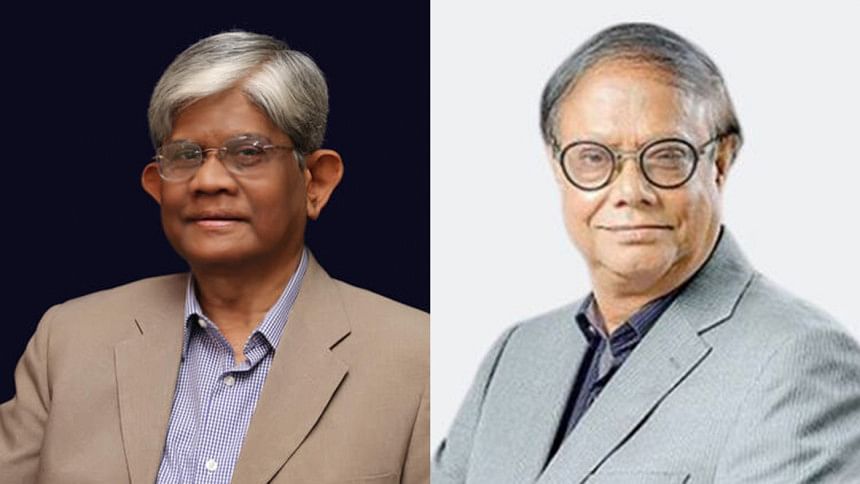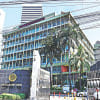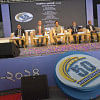Salehuddin, Mansur face surprise US judicial order

A US court on Thursday issued "bench warrants for the arrest" of Finance Adviser Salehuddin Ahmed and central bank Governor Ahsan H Mansur whom a power company wants to testify, as it seeks to enforce a collective $31.9 million in arbitration awards against Bangladesh.
The move prompted an immediate appeal from the Bangladesh government, Law360, a New York-based legal news publisher, reported.
US District Judge Carl J Nichols directed the US Marshals Service "to detain and bring to court" Ahmed and Mansur, granting a request from Smith Cogeneration (Bangladesh).
The company has described Ahmed and Mansur as "two of the most senior leaders" of Bangladesh's finances and says it needs their depositions as part of its decades-long effort to satisfy the arbitration awards.
But Bangladesh -- appearing on the docket for the first time since the case was filed in 2006 -- filed a speedy appeal to the DC Circuit Thursday afternoon, arguing that Judge Nichols had no jurisdiction to order the arrests of Ahmed and Mansur.
"In addition, the two individuals to whom the bench warrants are directed, both of whom are high-level Bangladeshi diplomats and officers of the International Monetary Fund and the World Bank, are immune from criminal and civil process in the United States," Bangladesh wrote in its appeal.
The immediate appeal, Bangladesh said, divests Judge Nichols' court of jurisdiction and renders the bench warrants unenforceable.
The Daily Star shared the Law360 report with Ahmed and Mansur and sought comments, but neither of them responded. This newspaper also contacted the chief adviser's Press Secretary Shafiqul Alam, but he declined to comment.
This newspaper tried to reach Md Touhid Hossain, foreign affairs adviser, DM Salauddin, chargé d'affaires at the Bangladesh Embassy in Washington, and Khandaker Masudul Alam, director general (North America) at the foreign ministry over the phone. None of them were available for comments.
When contacted by the newspaper, two top Power Development Board officials said they were unaware of the issue.
Smith Cogeneration, in its Wednesday motion for contempt sanctions, said Ahmed and Mansur were supposed to appear Wednesday for the depositions under a court order directing them to do so. But the pair did not show up, according to the motion.
"Without an order from this court holding the [government of Bangladesh] in contempt, the [government] will continue to ignore the authority of this court and will not comply or respond to the notices of deposition," Smith Cogeneration said in the motion.
Both Ahmed and Mansur were in Washington this week for the annual meetings of the International Monetary Fund and the World Bank Group.
Smith Cogeneration said the visit might be its only chance to take the depositions as the company chases down Bangladeshi assets.
Smith Cogeneration said it has been fighting for years to enforce the arbitral awards after an International Chamber of Commerce tribunal in London issued them in 2002 and 2003.
The dispute has its origins in 1997, when Smith Cogeneration signed a power purchase agreement with the Bangladesh government and its Power Development Board that provided for the construction of a barge-mounted power plant in northern Bangladesh.
Smith Cogeneration told the DC court in its 2006 enforcement petition that the government agreed to provide the company with all the required permits to complete the project, according to the Law360 report.
However, the government nixed the project in 1999 and never provided the company with the necessary permits, Smith Cogeneration claimed. It then cashed in a $1.5 million performance bond guarantee that had been funded by Smith Cogeneration.
The company initiated arbitration before the ICC tribunal that same year, and the tribunal later ordered the power board to fork over $13.5 million. The Power Development Board was also obligated to pay an additional $39,000, and the PDB and Bangladesh government were obligated to pay an additional $222,000, according to court filings.
A DC federal judge confirmed the awards in 2007, and the court revised its final judgment at Smith Cogeneration's request in May. Smith Cogeneration's counsel told Law360 that, taking into account interest and other costs, Bangladesh now owes Smith Cogeneration more than $31 million.

 For all latest news, follow The Daily Star's Google News channel.
For all latest news, follow The Daily Star's Google News channel. 








Comments